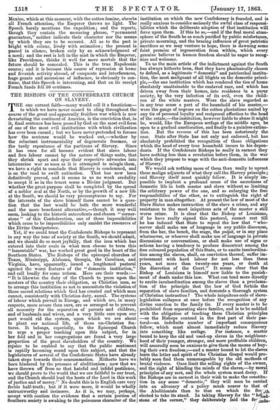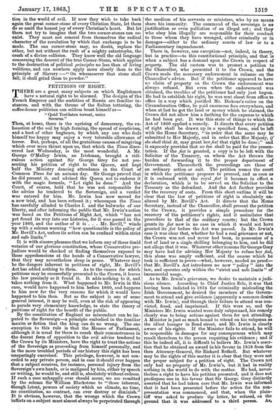THE BISHOPS OF THE CONFEDERATE CHURCH ON SLIVERY. T HE one
earnest faith—many would call it a fanaticism— to which we have never ceased to cling throughout the course of the great and apparently fruitless war which is now devastating the continent of America, is the conviction that, in it, final sentence has been passed by God on the most evil form of one of the most evil institutions with which civilization has ever been cursed ; but we have never pretended to foresee how the sentence would be worked out,—whether by the reluctant instrumentality of degenerate freemen, or the tardy repentance of the partizans of Slavery. Since it has once for all become evident that slave labour and free labour cannot by the nature of things unite, that they shrink apart and spur theif respective advocates into internecine war so soon as it is attempted to mingle them, we have a right to conclude that Slavery is condemned, and is on the road to swift extinction. That has now been definitively proved, and it seems to us no weak credulity to accept it as in the truest sense a Divine judgment. But . whether the great purpose shall be completed by the spread • of a nobler zeal at the North, or by the growth of a new life at the South, we should be very presumptuous to say. For the interests of the slave himself there cannot be a ques- tion that the last would be' both the more wonderful and, the more beneficent alternative,—though it may well seem, looking to the historib antecedents and chosen " corner- stone " of this Confederation, one of those impossibilities which cease to be impossibilities only amidst the resources of ' the Divine Omnipotence.
Yet, if we could trust the Confederate Bishops to represent in any way the tone of society at the South, we should admit, and we should do so most joyfully, that the iron which has entered into their souls in what men choose to term this "lamentable" war' has worked great good in the heart of the Southern States. The Bishops of the episcopal churches of Texas, Mississippi, Alabama, Georgia, the Carolinas, and Virginia, have, apparently, issued a lengthened pastoral against the worst features of the "domestic institution," and call loudly for some reform. Here are their words :— " It is likewise the duty of the Church to press upon the masters of the country their obligation, as Christian men, so to arrange this institution as not to necessitate the violation of . those sacred relations which God has created and which man cannot, consistently with Christian duty, annul. The systems of labour which prevail in Euroge, and which axe, in many respects, more severe than ours, are so arranged as to prevent all necessity for the separation of parents and children, and of husbands and wives and a very little care upon our part would rid the system, upon which we are about to plant our national life, of these un-Christian fea- tures. It belongs, especially, to the Episcopal Church to urge a proper teaching upon this subject, for in her fold and in her congregations are found a very large Tiroportion of the great slaveholders of the country. We rejoice to be enabled to say that the public sentiment is rapidly becoming sound upon this subject, and that the legislatures of several of the Confederate States have already taken steps towards their consummation. Hitherto have we been hindered by the pressure of abolitionism; now that we have thrown off from us that hateful and infidel pestilence, we should prove to the world that we are faithful to our trust, and the Church should lead the hosts of the Lord in this work of justice and of mercy." No doubt this is to English ears very feeble half-truth; but if it were more, it would be wholly untrustworthy and insincere. As it is, we may, perhaps, accept with caution the evidence that a certain portion of Southern society is awaking to the poisonous character of the institution on which the new Confederacy is founded, and is really anxious to consider seriously the awful class of responsi- bilities which the deliberate adoption of that institution will force upon them. If this be so,—and if the foul moral atmo- sphere of the South be as much purified by public misfortunes, private mourning, and the bracing influence of great patriotic sacrifices as we may venture to hope, there is dawning some faint promise of regeneration from within, which every genuine believer in human freedom should be eager to recog- nize and welcome.
To us the main article of the indictment against the South has always hitherto been, that they have pharisaically chosen to defend, as a legitimate "domestic" and patriarchal institu- tion, the most malignant of all blights on the domestic princi- ple,—the one institution which has rendered the ties of home absolutely unattainable to the enslaved race, and which has driven away from their homes, into residence in a purer society, by the very infection of its evil, even the child- ren of the white masters. Were the slave regarded as in any true sense a part of the household of his master,— were the gangs of negroes on the cotton plantations united by any tie of personal loyalty and reciprocal affection to the head of the estate,—the institution, however liable to abuse it might be, would, like the European serfage of the middle ages, be open to a gradual amelioration, and finally to a painless extinc- tion. But the reverse of this has been notoriously the case. State after State has not only not enforced, but has absolutely prohibited the recognition of those obligations which the head of every true household incurs to his depen- dants. If the Confederate Bishops be really in earnest they have nothing less than a revolution before them, in the war which they propose to wage with the anti-domestic influences of Slavery.
We would ask nothing more of them than really to uproot these malign adjuncts of what they call the Slavery principle ; and Slavery itself must quickly follow. It is simply im- possible to implant a profound sense of the sacredness of domestic life in both master and slave without so limiting the arbitrary power of the one, and so enlarging the free responsibilities of the other' as to extinguish the right of property in man altogether. At present the law of most of the Slave States makes instruction of the slave a crime, and any resistance to the most iniquitous acts of the master a still worse crime. It is clear that the Bishop of Louisiana, if he have really signed this pastoral, cannot rest till he has induced 'that State to repeal the law that "who- soever shall make use of language in any public discourse, from the bar, the bench, the stage, the pulpit, or in any place whatsoever, or whoever shall make use of language in private discussions or conversations, or shall make use of signs or actions having a tendency to produce discontent among the free coloured population of this State, or to excite insubordina- tion among the slaves, shall, on conviction thereof, suffer im- prisonment with hard labour for not less than three years, not more than twenty-one years, or death at the discretion of the Court." It seems clear that the Bishop of Louisiana is himself now liable to the punish- ment of death under this law. What can tend more directly to excite insubordination among the slaves than a proclama- tion of the principle that the law of God forbids the separation of slave families, and demands a thorough system of Christian instruction? The whole iniquitous code of slave- legislation collapses at once before the recognition of any divine sanction to the family tie. If every master is to be prohibited from separating slave familes, and is to be saddled with the obligation of teaching them Christian principles —as the Bishops contend in the first part of their pas- toral—an indefinite number of important consequences follow, which must almost immediately reduce Slavery into something like serfage. For instance, a master bound to keep the old and used-up slaves in the neighbour- hood of their younger, stronger, and more profitable children, will assuredly soon be anxious to give them the means of buy- ing their own freedom ;—and a master bound to let the slaves learn the letter and spirit of the Christian Gospel would pro- bably soon find them unmanageable by the old methods of brutal violence. Once limit the selling rights of the owner, and the right of blinding the minds of the slaves,—by moral principles of any sort, and the whole system must decay. If the Bishops are in earnest in their wish to make the constitu- tion in any sense "domestic," they will soon be carried into an advocacy of a policy much nearer to that of the Abolitionists than to that on which the Sori,th elected to take its stand. In taking Slavery for the " stone of the corner," they deliberately laid -the fo-,,inda.. tion in the world of evil. If now they wish to take back again the great corner-stone of every Christian State, let them do so amid the honest joy of every Christian's heart. But let them not try to imagine that the two corner-stones can co- exist. They must not conceal from themselves the radical -character of the revolution by which that exchange is to be made. The one corner-stone may, no doubt, replace the ether, but not without the rush of a mighty catastrophe, the crash of a divine collision. They know well the old language concerning the descent of the true Corner-Stone, which applies to the destruction of political principles no less than of living 'editions, and can nowhere apply more closely than to the principle of Slavery :—" On whomsoever that stone shall fall, it shall grind them to powder."































 Previous page
Previous page